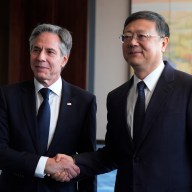OTTAWA – Canada quietly signed an international agreement on regulating private security companies in war-zones just weeks after a Canadian soldier was allegedly shot by a contractor during a confused firefight in Afghanistan last summer.
But it’s unclear what the government is doing to keep the hired guns on its payroll in check.
Canada was one of 17 countries to agree last fall to the Montreaux Document, which lays out responsibilities for the use of hired guns under international law.
Others nations have since signed on and the United States is among those in the process of enacting tough new regulations.
But except for a passing reference in the House of Commons last month, the Conservative government has been silent not only on the accord, but about measures it takes to hold security contractors accountable.
NDP defence critic Jack Harris said he believes a lid of secrecy was clamped over the agreement to prevent embarrassment and public scrutiny on the use of private security firms in Afghanistan.
“If they had a rule book and they followed it, you’d think they’d be very happy to tell you about it,” Harris said.
The Defence Department directed questions to the Foreign Affairs Department, which answered with an email late Tuesday afternoon.
The accord “is fully consistent with current Canadian policy and practice related to the use of private military and security companies,” said the note from Alain Cacchione.
The response did not explain why the government has kept silent, even though it had a hand in drafting the document.
The Canadian army employs at least four private security companies in Afghanistan. It uses them to guard road-building projects and as an added layer protection around forward operating bases, according to documents obtained by The Canadian Press under access to information.
Foreign Affairs pays for a host of other contractors.
Just weeks before the October federal election, Master Cpl. Josh Roberts was killed when his unit came under fire from both Taliban militants and possibly guards belonging to Compass Security ISS, which was escorting an aid convoy through Zhari district, west of Kandahar.
A military police investigation said Roberts died from a Taliban bullet, a conclusion his family has questioned.
The rising use of mercenaries around the globe has alarmed human rights groups, particularly in the aftermath of a series of shootings in Iraq involving the former Blackwater Worldwide, including the 2007 murder of 14 civilians in Baghdad.
The Montreaux document, initiated in 2006 at the behest of Switzerland and the International Committee of the Red Cross, reminds states and international agencies that they have an obligation to ensure that the private military contractors they hire are properly trained and respect international law.
Many international aid groups also use private security in war zones.
It is the responsibility of the country or group that retains the contractor to “take appropriate measures to prevent violations of international human rights law,” the accord says.
And if there are human rights abuses, the responsibility to act also falls on the shoulders of those who hired the guns, the non-binding agreement says.
It’s unclear what regulations or policies the Canadian government has put in place to implement its responsibility.
An expert in the use private security firms said he’s heard the government has toughened contract language for the deals it signs and doesn’t understand the reluctance to discuss it.
“This whole issue has flown under the radar,” said Dave Perrry, a defence analyst. “It would be nice to know that they are taking these sorts of (preventative) measures.”
The United States, Britain, China, Afghanistan, Iraq, Sierra Leone, South Africa, France and Germany are among the other signatories.
The use of hired guns is commonplace in over 100 countries, but particularly in Iraq and Afghanistan. Legislators in Kabul are considering tough new laws and regulations meant to rein in contractors.
Canadian soldiers often cringe when dealing with some private security companies.
The contractors – especially local companies in Afghanistan – are often ex-militia members who have little training, not much discipline, and a tendency to shoot at everything.
“You never want to be anywhere near these guys,” a Canadian soldier recently advised a western journalist at forward operating base outside of Kandahar.
“If you’re ever in an area with them and there’s gunfire just duck and cover. They stop wherever they’re going and open up 360 (degrees).”
Some private contract teams, especially those hired to guard dignitaries, are made up entirely of ex-soldiers from western countries.
But other companies guarding bases or escorting aid convoys are made up of local gunslingers led and mentored by former American, British, Dutch and African soldiers.
One contractor, a South African with 17 years military experience, said training young Afghans can be an exercise in frustration.
“Once they get an AK in their hands, they think they know everything,” the contractor said in an interview, conducted on condition neither he nor his company be named.
“It takes a long time to show them that just opening up and emptying their magazine isn’t the way.”
















